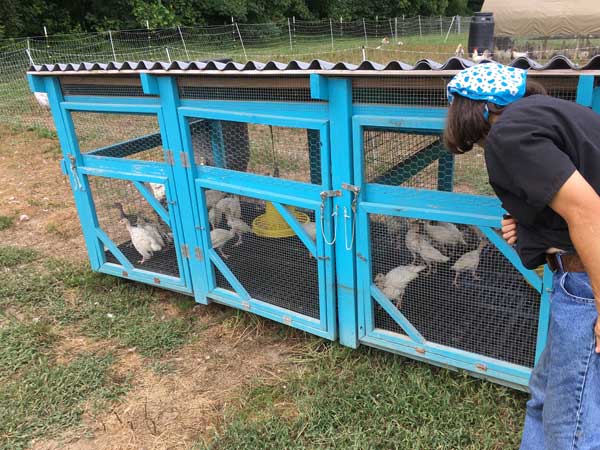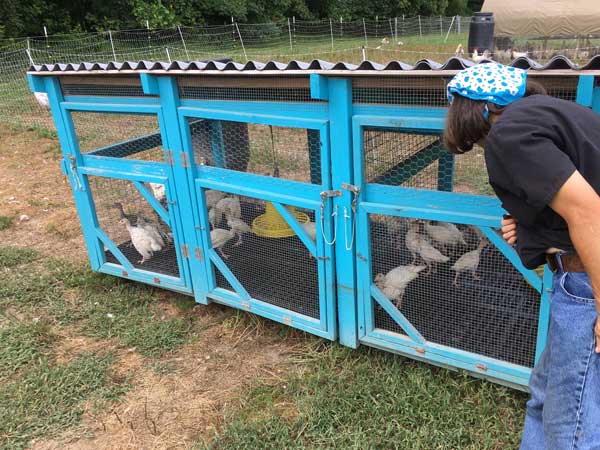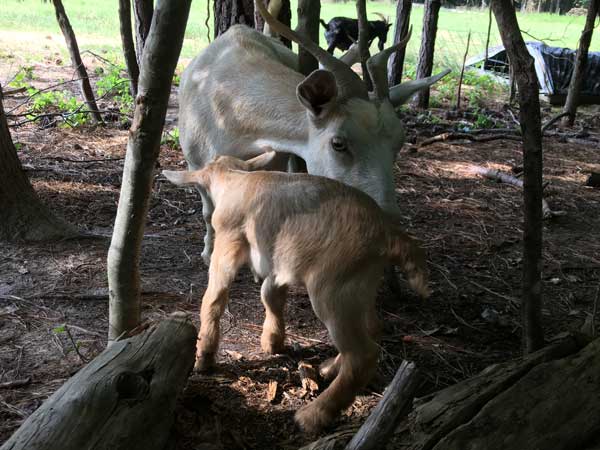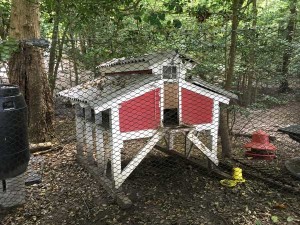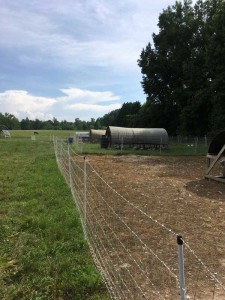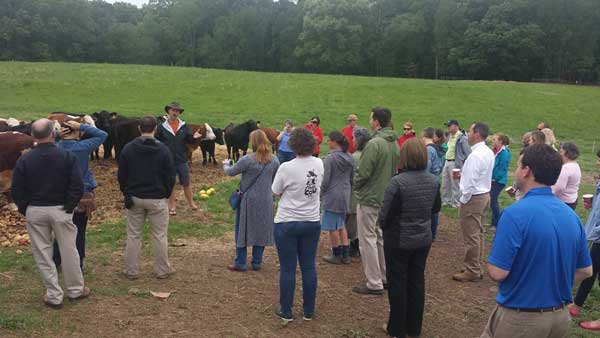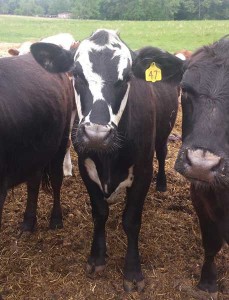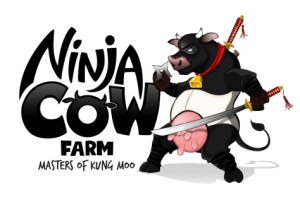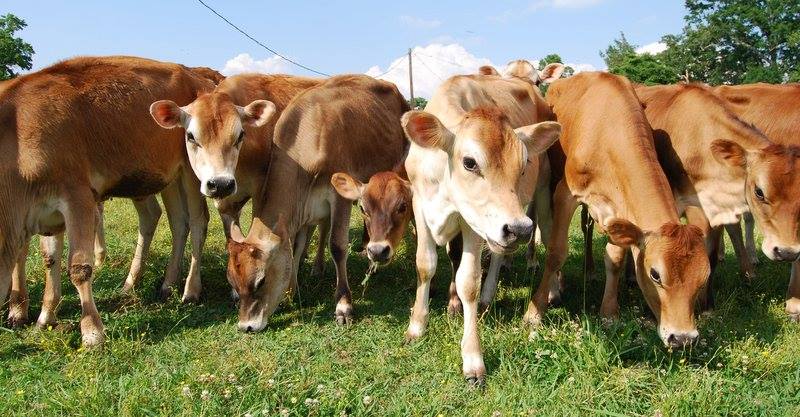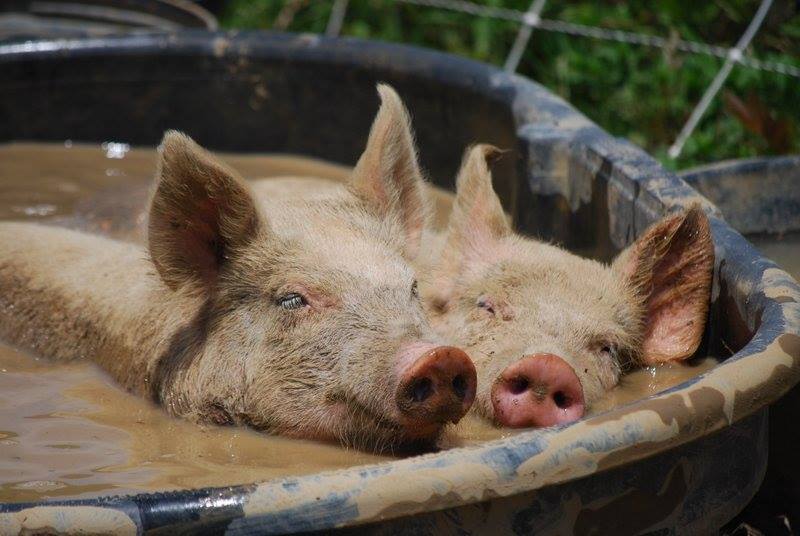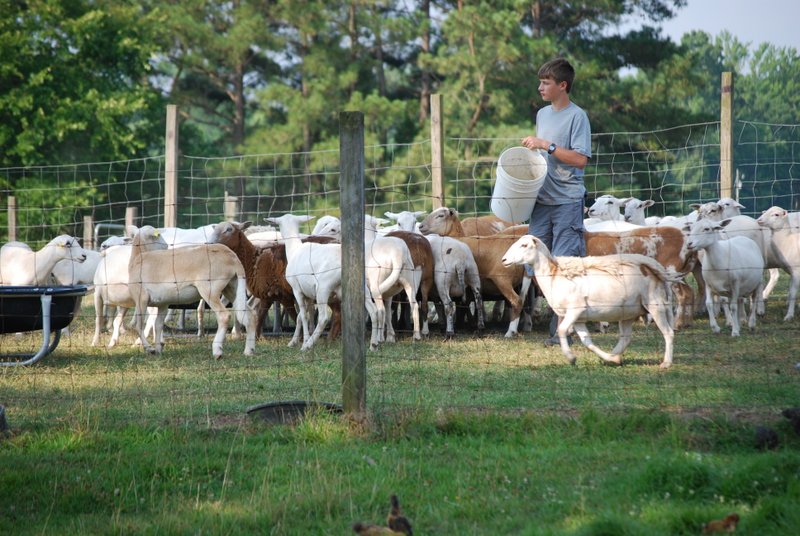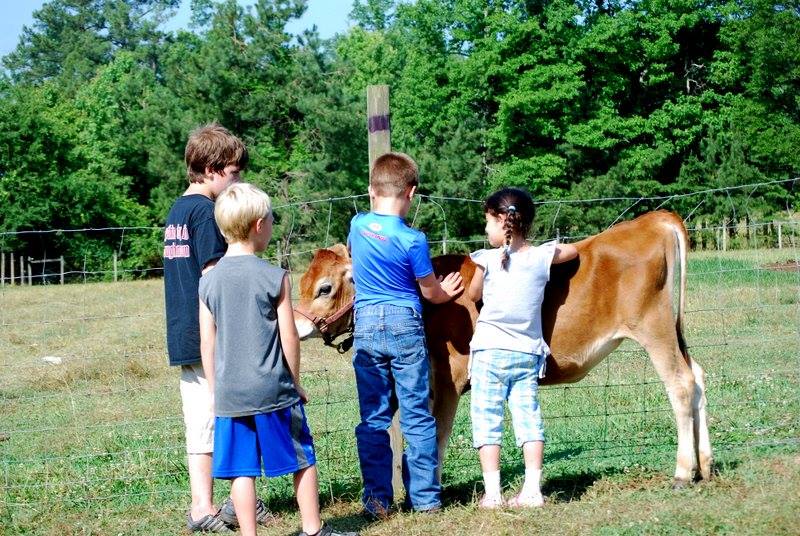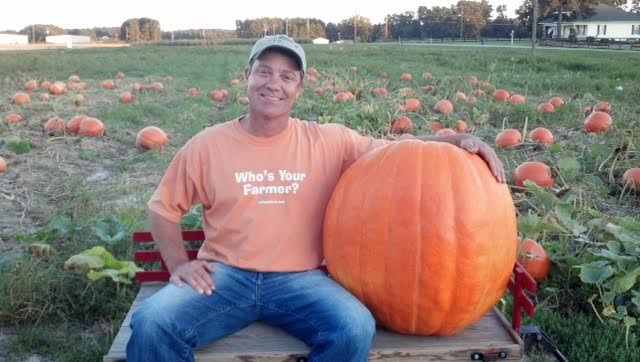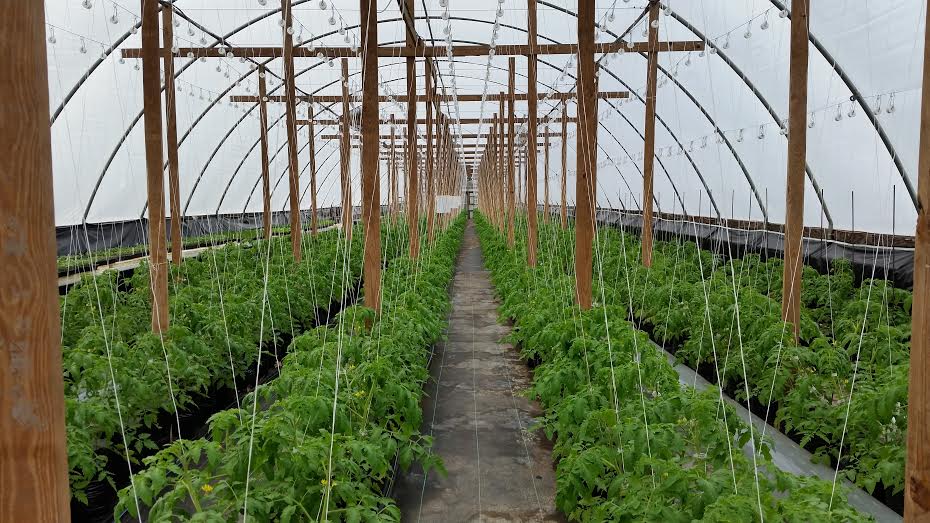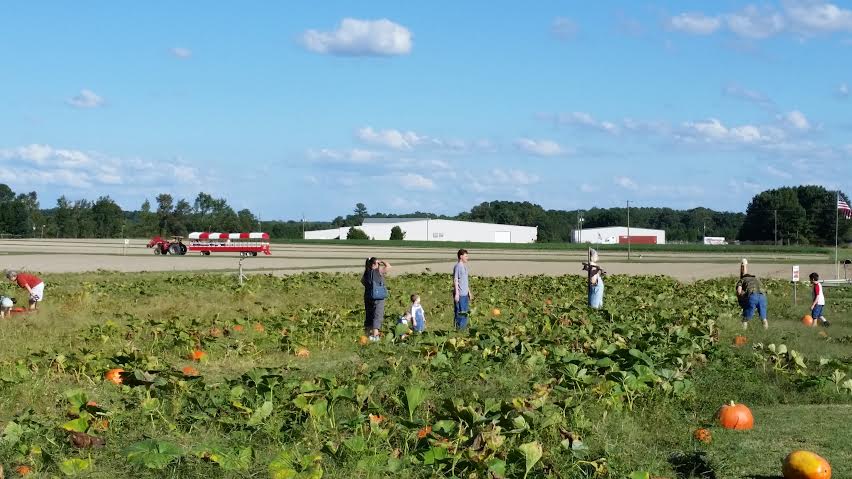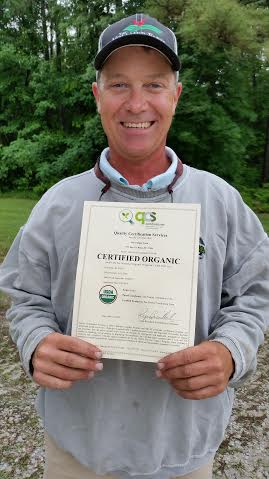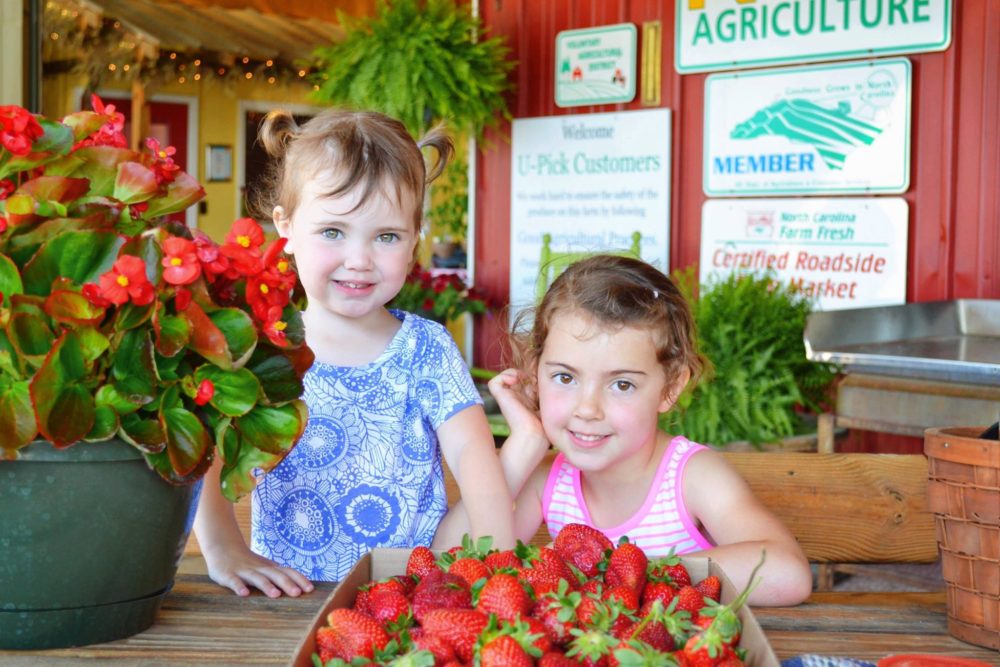by Emily Mueller, Wake County CES
How it all got started…
Walking from one vivacious, active pen to next, it is hard to imagine how Dr. Julie Gauthier, owner of Chickcharney Farm, initially got started over eight years ago. Driving up to the farm entrance, I didn’t find any showy marketing signs, nor any of Hansel’s or Gretel’s breadcrumbs to lead the way. Just a few acres of green pasture with a variety of poultry herds healthily grazing within electrically fenced-in custom-built “mobile homes.” Not many people get the chance to see this beautiful farm in Wake County, but, you’ll be able to visit on the Eastern Triangle Farm Tour, Sept. 23-24, 2017 from 1-5 PM!
Being a single-person farm operation, Dr. Julie quickly guided us into what was happening at the farm. As she introduced me to the individual poultry breeds, I asked how she got interested in raising birds. It was clear that Dr. Julie strived to farm with a purpose; and that purpose, she later explained, is driven by a strong commitment to conservation. Growing up on small suburban lot in Michigan, she and her family raised much of their own food, growing organic vegetables and raising domestic animals for either meat or eggs. Looking back, Dr. Julie reflected that her concept of conservation farming didn’t come to fruition until she peered at some “old” heritage livestock breeds depicted within the pages of a picturesque coffee-table book that attracted her eye during her tenure at the College of Veterinary Medicine of Michigan State University (MSU). From there, more than eight years ago, Dr. Julie began nurturing her agricultural skills – raising micro-greens, growing mushrooms, and raising heritage poultry and thus, Chickcharney Farm was born.
What is “Chick-Charming” about Chickcharney
Heritage preservation. More than eight years ago, Dr. Julie began raising Delaware chickens as an effort to conserve this rare breed from the brink of extinction. Since then, she has taken on multiple other breeds categorized, beginning with most endangered criterion first, as “critical”, “threatened”, “watch”, “recovering” or “study” on the Livestock Conservancy’s Conservation Priority List. Currently, the farm raises Delaware chickens (Watch), Magpie ducks (Threatened), Saxony ducks (Threatened), Pilgrim geese (Threatened), Narragansett turkeys (Watch), Beltsville Small White turkeys (Critical), dark Cornish chickens (Watch), Delaware blue hen (beyond ‘Critical’), Aylesbury ducks (Critical), and Myotonic fainting goats (Recovering). More information about these breeds can be found on the Chickcharney Farm or Livestock Conservancy websites.
Providing alternatives to the standard commercial poultry fare. Simply put, Dr. Julie states, “I like choices” when it comes to food. She then explains in detail the importance of these heritage breeds and how they all “play their part in the food system.” Many folks ask her why the traditional breeds are so expensive and the reasons are many. First of all, they are not a “food for the masses,” meaning that it will take longer for these birds to put on weight than the average commercial hybrid type. These breeds are meant to naturally forage in pasture and they gradually increase in size, which provides a better flavor and more interesting culinary qualities than industrial breeds. Furthermore, the heritage breeds are selectively bred, which means that Dr. Julie selects the best performers within each generation to pass on their genetic traits to future progeny. Such selective breeding in few generations can quickly lead to top-performing herds that are best-adapted for their local environment.
Minimal environmental impact. Dr. Julie continues to follow the sustainable principles she learned in childhood. Contrary to many commercial poultry standards, Dr. Julie does not use medicated animal feed for her birds but allows them to naturally graze on what they were originally bred to eat. This allows the animals to naturally build up their immunity to local diseases and infectious pests. Those that naturally succumb to infection or are not ideal representatives of the breed are culled out of the breeding population. Heightened sanitation is required to maintain healthy animals in this system. Such a management system is more labor-intensive but helps build up a hardier breeding stock that becomes better adapted to overcome adverse local conditions.
A constant roller coaster ride for any resident farmer…
When I asked Dr. Julie what her main challenge was in maintaining the farm, she quickly answered (in a particularly disgruntled expression), “PREDATORS.” She always tells any poultry enthusiast to invest in electric fencing – it is well worth it. It was a hard-learned lesson that she wished she had learned years before. She also brought on board Louis, a guard donkey, who is a fierce deterrent of ground predators. In addition to Louis, Pilgrim Geese are additional herd guardians that help protect the birds against aerial predators: hawks and owls.
On a good note, Dr. Julie is known for her quality breeds and word-of-mouth marketing has led to increased sales over the years to buyers from many states. The initial threatened breed that the farm began rearing, the Delaware chicken, has since moved off the “threatened” list and is currently under “watch,” indicating a significant increase in numbers in recent years. Dr. Julie got a sparkle in her eye as she told me, then smiled as said, “I’d like to think that Chickcharney Farm contributed to that rise [in the Delaware chicken population].”
Visit Chickcharney Farm and other amazing sustainable farms on the Eastern Triangle Farm Tour, happening Sept. 23-24, 2017 from 1-5 PM. Plan your tour route and buy your carpass today! CFSA members save $5 on advance tickets!
Resources:
Current Conservation Priority List of Poultry Breeds, the Livestock Conservancy; https://livestockconservancy.org/index.php/heritage/internal/conservation-priority-list
Raising Chickens – Breeds to Consider, P. Allen Smith Home Garden; http://pallensmith.com/2016/02/11/raising-chickens-breeds-to-consider/
The American Poultry Association; http://www.amerpoultryassn.com
The Virtual Grange and Growing Farmers Initiative, http://www.virtualgrange.org/about/
Chickcharney folklore, http://mysteriousuniverse.org/2014/07/cryptids-of-the-caribbean-part-2-the-bahamas/


